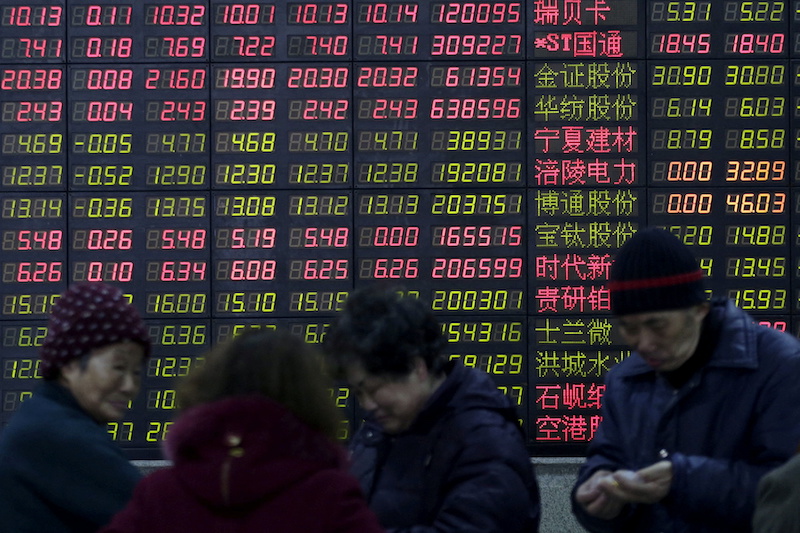Asia’s major markets were squarely on the back foot again on Friday, forced into retreat as the threats of inflation, rate hikes and recession stalked trading floors.
Chinese stocks bucked the trend, lifted by more stimulus promises from Beijing but elsewhere across the region the mood was downbeat.
Stocks were headed for their worst week since the markets’ pandemic meltdown in March 2020 as leading central banks doubled down on tighter policy in an effort to tame inflation, setting investors on edge about future economic growth.
Also on AF: Gazprom, CNPC Sign Deal on Supplying Russian Gas to China
Japan’s Nikkei index posted its biggest weekly drop in more than two years, tracking Wall Street’s plunge, even as the Bank of Japan maintained its massive stimulus and provided no negative surprises.
The Nikkei share average ended 1.77% lower at 25,963.00, its lowest close since May 12, after falling as much as 2.7% earlier in the session.
The index, which lost five sessions in six, pared some losses after the central bank’s announcement, but still posted a weekly drop of 6.6%, the sharpest loss since the week ended April 3, 2020. The broader Topix lost 1.71% to 1,835,90, shedding 5.5% in the week.
Technology heavyweights led losses on the Nikkei, with chip-making equipment maker Tokyo Electron shedding 5.04% and chip-testing equipment maker Advantest losing 4.09%.
Across the water in China, the Hang Seng Index rose 1.10%, or 229.57 points, to 21,075.00 and the Shanghai Composite Index gained 0.96%, or 31.40 points, to 3,316.79 after Beijing pledged to increase annual tax cuts, including VAT credit rebates to help spur growth.
Sharpest Weekly Slides Since 2020
But stock markets elsewhere across the region were in meltdown, with many set for their sharpest weekly slide since the early days of the pandemic in 2020.
Shares in Taiwan dropped 1.3% and were on track for their worst weekly performance since May 2021. South Korean shares fell over 1% and were set to post their biggest weekly drop since March 2020. Equities in Malaysia and Thailand were also tracking their worst weekly performance since early 2020.
Indian stocks were pushed back too with Mumbai’s signature Nifty 50 index down 0.27%, or 41.75 points, at 15,318.85.
US stocks closed sharply lower overnight in a broad sell-off, as recession fears grew following moves by central banks around the globe to stamp out rising inflation after the US Federal Reserve’s largest rate hike since 1994.
The US rate rise, the first such Swiss move in 15 years, a fifth rise in British rates since December and a move by the European Central Bank to bolster the indebted south all took turns in roiling markets.
The Bank of Japan was the only outlier in a week where money prices rose around the world, sticking with its strategy of pinning 10-year yields near zero on Friday.
After a week of punchy moves across asset classes, world stocks were down 0.2% on Friday to take weekly losses to 5.8% and leave the index on course for the steepest weekly percentage drop in more than two years.
S&P 500 futures were up 0.5% and Nasdaq 100 futures rose 1% but they are well underwater on the week.
Bonds, Currencies Jittery
“The more aggressive line by central banks adds to headwinds for both economic growth and equities,” said Mark Haefele, Chief Investment Officer at UBS Global Wealth Management. “The risks of a recession are rising, while achieving a soft landing for the US economy appears increasingly challenging.”
Data from analysts at Bank of America showed more than 88% of the stock indexes it tracks are trading below their 50-day and 200-day moving average, leading markets “painfully oversold.”
Bonds and currencies were jittery after a rollercoaster week.
US labour and housing data came in soft on Thursday, on the heels of disappointing retail sales figures, with the worries knocking the dollar and helping Treasuries.
Benchmark US 10-year Treasury yields fell nearly 10 basis points overnight but wobbled higher to 3.2502% during early European trade.
Growth fears took oil on a brief trip lower before prices steadied. Brent crude futures were last at $120.55 a barrel. Gold was down 0.5% at $1,848 an ounce and bitcoin climbed 3.5% to $21,099.
Key figures
Tokyo – Nikkei 225 < DOWN 1.77% at 25,963.00 (close)
Hong Kong – Hang Seng Index > UP 1.10% at 21,075.00 (close)
Shanghai – Composite > UP 0.96% at 3,316.79 (close)
New York – Dow < DOWN 2.42% at 29,927.07 (close)
- Reuters with additional editing by Sean O’Meara
Read more:
Japan Holds Steady on Forex Policy as Yen Stumbles
Speculators Confront Bank of Japan in Bond Market Showdown























